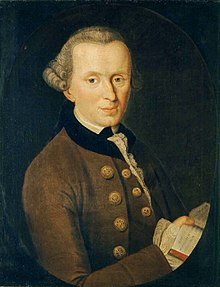Immanuel Kant (Wikipedia)
Immanuel Kant (/kænt/;[15] German: [ʔɪˈmaːnu̯eːl ˈkant, -nu̯ɛl -];[16][17] 22 April 1724 – 12 February 1804) was a German philosopherwho is a central figure in modern philosophy.[18] In his doctrine of transcendental idealism, he argued that space, time and causationare mere sensibilities; "things-in-themselves" exist, but their nature is unknowable.[19][20] In his view, the mind shapes and structures experience, with all human experience sharing certain structural features. He drew a parallel to the Copernican revolution in his proposition that worldly objects can be intuited a priori ("beforehand"), and that intuition is therefore independent from objective reality.[21] Kant believed that reason is the source of morality, and that aesthetics arise from a faculty of disinterested judgment. Kant's views continue to have a major influence on contemporary philosophy, especially the fields of epistemology, ethics, political theory, and post-modern aesthetics.
In one of Kant's major works, the Critique of Pure Reason (1781),[22] he attempted to explain the relationship between reason and human experience and to move beyond the failures of traditional philosophy and metaphysics. Kant wanted to put an end to an era of futile and speculative theories of human experience, while resisting the skepticism of thinkers such as David Hume. Kant regarded himself as showing the way past the impasse between rationalists and empiricists which philosophy had led to,[23] and is widely held to have synthesized both traditions in his thought.
To continue reading click on the link below:
https://en.wikipedia.org/wiki/Immanuel_Kant




No comments